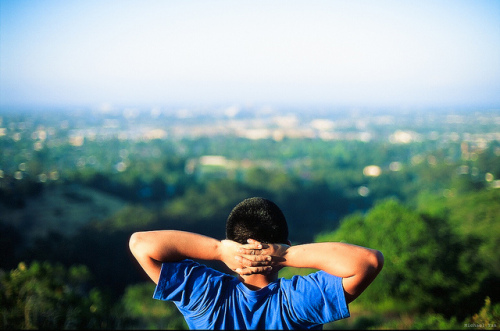A simple breathing exercise to help you control your anxiety

flickr image by: Michael Yan
We all experience anxiety from time to time: fleeting moments of “nerves” before speaking, job interviews, trips to the dentist, or new social situations are common examples of anxiety provoking experiences.
When anxiety spills outside a specific area and overflows into our life in general it can begin to take over key areas of our life with unwanted symptoms and an awful sense of unease. It might affect our sleep, our work, our relationships and even our health.
That’s when we need some help to tame and contain anxiety and breathing exercises are one very effective way to do that.
Breathing exercises can help you control your anxiety because when you control and steady your breath you have a direct impact on your heart rate and, in turn, your mind. As your breath slows down and clams down, so does your heart, and as your breathing and your heart rate slow down and calm down your mind and thoughts will too.
Yoga, Ayurveda and Chinese Medicine all teach that when we are stressed or anxious our breathing becomes shallow, rapid and unsettled. The more upset our breath is, the more upset our mind is. Fast, shallow breathing stirs up our thoughts. Calm, steady breathing helps calm our thoughts.
Breathing exercises can help you ease anxiety and bring a feeling of relaxation to your entire body.
You can use breathing exercises to:
stop adrenaline coursing through your veins
help with dizziness
slow your racing heart
clear your head and bring rational thinking back online
With your own breath, you can learn to calm the symptoms of a panic attack and regain a sense of control.
A good place to begin is by developing awareness of your breath.
When we are anxious, or stressed we usually take very shallow breaths, as if we are breathing from our shoulders. But healthy, relaxed breathing, uses the diaphragm - not the shoulders!
A relaxed breath is deep and slow, the chest expands and the diaphragm draws incoming air down into the lungs, filling them completely.
Here’s a simple excercise to help you start developing awareness of your breath:
Sit down and put your right hand over your stomach and your left hand in the middle of your chest.
Close your eyes and pay attention to what your hands tell you about your breath.
Don’t try and change anything - just breath normally and notice.
Notice the rise and fall of your chest, the rate of your breath, and how deeply it enters your lungs.
Sit with your breath for a couple of minutes, if you can manage five minutes, that’s even better. Just sit and notice.
Awareness is the first part of positive change. By regularly checking in on your breath you can develop an awareness that will help you notice and adjust your breathing anytime you feel stressed or anxious.
And the more you notice and calm your breath the more control you will gain over your anxiety.
Listen to the podcast here:
